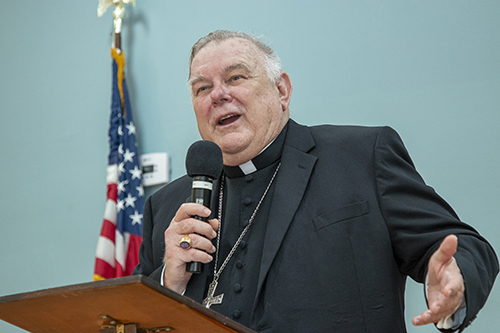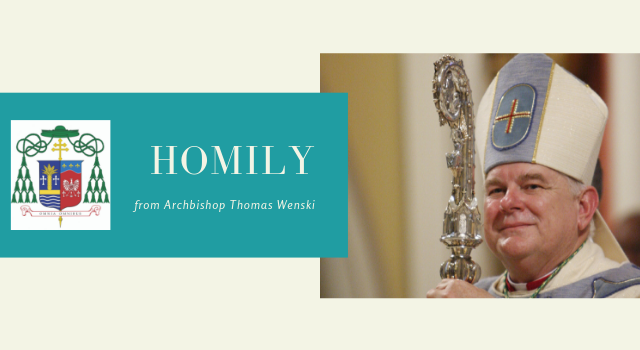By Archbishop Thomas Wenski - The Archdiocese of Miami
Archbishop Thomas Wenski gave this reflection on Exodus 6 to synod members — three representatives from each parish — gathered for reflection and discernment after the Mass that opened the Synod on Synodality in the archdiocese, Oct. 17, 2021.
As you know by now, Synod means “walking together.” Jesus in the Gospel is found most usually walking with his disciples. His ministry is that of an itinerant preacher: He has no place to lay his head. Throughout his ministry, he walked together with his disciples — and he was going “one way,” the way to Jerusalem, the place of his “Passover” from death to life. In the Gospel we heard during the Mass, he walked with the disciples of Emmaus, until he put them back on the right path, the path back to Jerusalem.

Photographer: ANA RODRIGUEZ-SOTO | FC
Archbishop Thomas Wenski addresses synod members, three from each parish, before the start of their discernment activity after the opening Mass for the Synod on Synodality, Oct. 17, 2021.
In a sense, God has called us to walk with him since he called the Israelites out of Egypt, the land of their slavery, to the freedom of the Promised Land. Exodus is another combination of Greek words, like synod. Exodus means “going out” —they had to go out of Egypt in order to be freed. The Exodus began with a Passover Meal — but that Passover Meal pointed to their passing over the Red Sea, which was the definitive break with Egypt.
Just as Moses led the Israelites from Egypt to the Promised Land, so too Jesus, the new Moses, would “Passover” from death to life. And Jesus’ own “Passover” began with a Passover Meal that anticipated his Passover from death to life when he would die on the Cross.
Our baptism is a baptism into the dying and rising of Our Lord Jesus Christ: It is our “Passover” from death to life. We could say that the Israelites were “baptized” in the Red Sea. They commemorate their Passover with the Seder meal; we commemorate Jesus’ Passover with the Eucharist. The Eucharist commemorates Jesus’ passion and death, but our communion in his Body and Blood anticipates our Resurrection when we will be seated at the banquet of life in his Kingdom. But to get to that banquet, the fullest realization of the Paschal mysteries, we, like the Israelites, must continue to walk together. And just as the going got rough for the Israelites — their leaving Egypt was not a walk through the park but through harsh and dangerous desert — our journey together takes us through the existential deserts of our time. The Israelites in the desert are a type of the Church, foreshadowing of the Church: their temptations are the same ones we experience today; the dangers they faced, we also face, and the sins they committed, we commit today. If we walk alone, we will walk, like the disciples of Emmaus, sad and dejected, and most likely go the wrong way.
When they first translated the Hebrew scriptures into Greek, the word used to describe the Israelites in their sojourn through the desert on their way to the Holy Land was Pa-roi-ki-a. That’s where we get the word “parish” from. Parishes are communities of sojourners — we have no permanent home here, our citizenship is in heaven, and so we sojourn together — SYNOD — walk together but we walk in hope because we walk with Jesus who gives direction and purpose to our lives.
When God created man, he created us social beings. Scripture says, it is not good for man to be alone. We were made for relationships, for communities. And when Christ came to save us, he came to save us in community. In fact, we are saved precisely through our joining a community, the family of God, in baptism. Our Catholic faith is not a “Jesus and me” religion. It is a Jesus and we religion.
We walk together — sojourners on a synodal path. But this walk is not a cake walk, it is not a stroll in the park, it is a trek through the desert. We are to make our Exodus, to go out of ourselves, our egoism, our selfishness; we are to break the habits of sin. We go as we pray in the Salve Regina, “banished children of Eve, mourning and weeping in the vale of tears.”
So, we know what the word “Synod” means. But this synod — in all its three phases — is a Synod on synodality. What then is synodality? I would venture to say that it means our entire experience of Church as a pilgrim people, as sojourners. We are to discern by listening to one another, and to the Holy Spirit, the path that Jesus wishes us to take in the 21st century. The Church is synodal —because the Church cannot afford to stop and not to continue the journey. Through communion — and here the word does not primarily refer to the reception of the Eucharist, it is “koinonia,” fellowship, a fellowship in which all the baptized are called to participate and through which we have all receive a mission, a great commission to announce the good news to all the world.
And so, synodality — a bit of a clumsy word, certainly an unfamiliar word, but a word that describes how we as baptized Catholics are to walk with each other and with the Lord.
We walk together — to encounter Christ but also to encounter each other, to create an “ever wider” we of brothers and sisters, to listen one to the other and all to the Holy Spirit so that our hearts are again set aflame with new passion, to discern what God is asking of us today. Discernment must be about coming to see the world on God’s terms and not on our terms.
This is, as I said, no walk in the park. We walk through the existential deserts of our times where too many people are dying of thirst because they do not know to drink of the waters of God’s word and sacraments. The desert is the realm of the devil, a place of serpents and wild animals.
So, this is a synod on synodality — and synodality is about our journey together to God’s kingdom, and therefore this synod is quite important. It is not just about picking out the color schemes for painting the church hall, it is about communion, participation, mission — in other words, in the words of Pope Francis: “synodality expresses the nature of the Church: its form, its style and its mission.” And in the Church, there are “no extras,” everyone is a protagonist. Everyone has his or her role.

